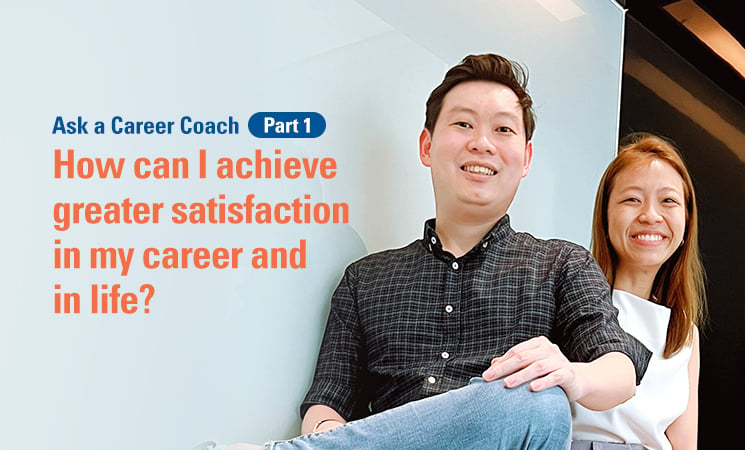Ask a Career Coach: How can I achieve greater satisfaction in my career and in life?

How do Singaporeans define career satisfaction? Traditionally, it would be a career that offers stability, success and wealth. But Singaporeans today see things differently.
In December 2021, 42% of those surveyed by global jobs portal Indeed cited the COVID pandemic as a key factor for wanting to quit their jobs. Kisi’s May 2022 study concluded with Singapore as the fourth most overworked city in the world, as more workers face regular overtime and burnout.
Recent world events have also made even more people reconsider what truly matters to them. In March 2022, Silver Ribbon (Singapore) found from their study that having a sense of fulfilment and work-life balance has surpassed salary as the top consideration when choosing a job.
With so many factors to consider, how can career and life satisfaction be redefined? For individuals who are both career-driven and family-oriented, can balance between both be achieved?
Career coaches Tay Boon Peng and Sherlynn Yap from NTUC’s e2i took on some burning career questions from the public. The pair shared tips and techniques on how jobseekers and employed workers can evaluate priorities, set realistic goals and take active steps to achieve greater satisfaction in career and life.
For Jobseekers:

Q: How can I find the role that best fits me? How do I know that I’m in the right career?
1. Try out different roles and do not be afraid to fail.
Boon Peng: Some people have aspirations about certain roles and realise they hate the work or industry only once they’re in it. If this happens to you, don’t blame yourself for choosing a “bad” job. The more we experience in life, the better we become at defining what we like, dislike and who we want to become. Realising that you don’t like the role you chose is not career regression. You’re progressing as you now have more clarity.
Sherlynn: Landing your perfect job for you on your first try is very rare. In school, we’re in a very protected bubble and have a very idealistic outlook on working. Entering the workforce can be challenging as you’ll start to realise the wide gap between schooling and working. If you’re still studying, take on multiple internships during your various semester breaks to experience what working is truly like.
2. Run your own race and avoid comparison.
Boon Peng: Everyone is different. Even if you studied the same thing, your personalities, ambitions and talents could be worlds apart. Avoid comparing yourself to your peers’ career progress. If keeping competitive motivates you positively, that’s okay. But if comparing only makes you bitter and lowers your self-esteem, you should stop. Stay focused on your own race and not get distracted by others’ journeys.
For Employed Individuals:

Q: How do I know whether or not I’m happy at my workplace? Should I find new opportunities or stay at my company?
1. Map out what you want to achieve in your career.
Boon Peng: Always go back to your priorities in life. Identify your short- and long-term goals. If you’re career-minded, you should always have a long-term goal of what you want to achieve in a certain number of years.
Even if you’re not entirely satisfied in your current role, evaluate whether your job offers the experience and skill sets needed to meet your long-term career goal. If achieving your long-term career goal is very important, persevere and pick up as much as you can from this role. But if you find that you’ve gained everything you can from your job, perhaps consider moving to somewhere else with new opportunities.
Yet, even if your role offers valuable experience, nothing is stopping you from leaving. Consider whether you’re happy with your employer, colleagues, or work culture. While you may be able to achieve your end goal at a company, if work is affecting you to the point where you’re breaking down often, that’s not good. No career is more important than your mental well-being.
2. Open up to your manager about your struggles.
Sherlynn: Remember, the choice is always yours, but know that resigning is not the only solution. You can either quit your job or try working things out with your manager. Be honest with your manager about your challenges and what support you need to get through this, then see if the situation gets better for you.
Boon Peng: Speaking to your manager is intimidating and may even seem hopeless – what if his/her reaction is bad? However, if you don’t even try voicing your concerns to your boss, your chance of things changing is zero. Be brave and give it a shot.

Q: How can I achieve a good work-life balance?
1. Decide what your life priorities are and which matters most now.
Boon Peng: It depends on the stage of life that you’re in. Fresh grads are usually more career-minded, so they tend to prioritise time at work over their personal time. But individuals who are more family-oriented, particularly parents, may want to spend little to no time working over the weekend for more time with the kids. Be clear on what matters most to you at this point in life – career, finances, family, health etc.
Sherlynn: Sometimes there isn’t a clear-cut answer; in life, there are always trade-offs. During our coaching sessions, we’ll help our clients to articulate what they want in life and find the most feasible path he/she can cope with. If the client can find a way to achieve all his/her goals and be happy, fantastic. If not, something has to go. Sometimes we can’t have everything that we want.
2. Identify factors causing this loss of balance and set healthy boundaries.
Boon Peng: Another element that perpetuates this blurring of lines between work and life is the Singaporean mentality of striving: “I cannot lao kui (Hokkien for losing face). I need to prove myself.” That is also one of the reasons people work beyond regular work hours.
Firstly, it’s not about how long you work, but about how productive you are when you’re working. You can work 10 to 12 hours, but if you’re not productive during this time, why not streamline and aim to be very productive within the standard eight hours?
Remember your priorities. If your priority is to make more time for yourself and your family, you have to set some boundaries. Start each day with a fixed, realistic list of things you need to complete to help you plan your time. Even if requests trickle in towards the end of the day, if they’re not urgent, resist responding until the next day – no matter how great the urge to open our work chats or check emails after hours is.

Sherlynn: But even if you plan your day to the second, what if your boss pings you at 5.30pm for a meeting? If this happens quite often and is affecting you greatly, maybe you need to have a conversation with your manager.
For example, perhaps in this phase of your life, you have a young kid. You could request more flexible work hours, promising that you’ll still get things done – just not within the standard work hours. Of course, the way you make requests and set boundaries with your boss matters too. You cannot demand that you get exactly what suits you.
3. Try working towards work-life integration instead.
Sherlynn: Having work-life integration is being able to integrate different areas of your life outside of the conventional 9am to 6pm model – and still feel rested.
Going back to their earlier two points made about productivity and flexibility. Let’s say I start work at 7am because I’m most productive in the morning. I could clear most of my work by noon, go out to do groceries, end my workday at 5pm and spend the evening with my kids. You plan your own timeline based on your life circumstances and your priorities. But this only works if you have an understanding employer, so having that conversation is important.
Meet with a Career Coach from NTUC’s e2i

Have more personal career questions for our career coaches?
Book an appointment with a career coach here or scan the QR code above. Sessions are complimentary for all Singaporeans and PRs. Available in person, via Zoom or over the phone. For tips on how to prepare for your career coaching session, click here.
e2i’s career coaches are dedicated to supporting you at the crossroads of your career journey, whether you are making a career switch or embarking on a new job. Career coaches will help you understand yourself and the current labour market, plan your next career steps, and gain the confidence to achieve your goals.



